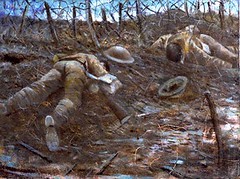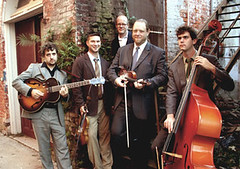Much of the life of a special needs parent involves anticipating the worst case scenarios and avoiding them if possible. It never stops, and it never should. If I want to enjoy the unique privilege of being Schuyler's father and friend, the price I pay is never-ending monster watch, a constant vigilance against this grand rough world and its many harms. And really, even at its worst, that price is a bargain.
But sometimes, our vigilance can stand in the way of seeing the things that are in fact going well, going better than expected. I see a number of friends online taking the month of November to give thanks for the good things in their lives. Now personally, I've reserved November for
growing a frightening critter on my face and turning an age that might be described as "thirty-fourteen", but I will take this opportunity to express my gratitude, and my relief, for one very important item.
In some very significant ways, Schuyler is thriving at her new school. And her teachers believe in her.
We had the opportunity to drop in at the end of the school day yesterday, in order to pick up the band fundraiser pizza kits we ordered. (Cheese pizzas were a little iffy, but the cheesy bread? I am powerless.) When we walked in, the school was a swirling mass of preteen chaos. I felt a little like Richard Dreyfuss at the end of
Close Encounters. And when we found Schuyler, things at first glance were not very encouraging.
We walking down the hall and looked for her near her locker. We only found her after the kids thinned out a bit, for the simple reason that Schuyler was sitting on the floor, her belongings spread out around her as she loaded them into her backpack. For a moment I thought that she had been knocked down Chumbawamba-style, her books scattered by some bully, but when she looked up and saw us, she greeted us cheerfully.
Turns out that's how she does it every day. And for some reason, no one in the crazy busy hallway seems to mind. They just work around her.
As we walked down the halls, I could see once again that as I mentioned elsewhere,
Schuyler mostly stands apart from her neurotypical classmates. But what I saw clearly yesterday was that although she's not entirely or even mostly part of their world, they are very much a part of hers.
Schuyler walks down the hall like Mayor McCheese. Every few feet, a student or a teacher says hi to her. One tall girl who had to be two grades older greeted her unhesitatingly with a big hug. Schuyler isn't deeply involved in the social fabric of her classmates, and perhaps it was a silly dream to hope otherwise. But I don't think she's being bullied, and I don't think she's being ignored. If she remains something of an enigma to her classmates, she's an intriguing one, and a mystery worth exploring.
Talking to a few of Schuyler's teachers gave us more information. Schuyler participates enthusiastically and with increasing accuracy, and she gets help from her classmates. As her confidence grows, so does the quality of her participation. Her band director is especially excited about Schuyler's work. We were all ready for Schuyler to require a great deal of modification in her band class, and there's been some. But not as much as any of us anticipated. She's playing independently on the marimba in particular, and yesterday was playing her part by herself in a group.
Jolly Old St. Nick, she's got your number.
The thing that more than one teacher expressed that surprised me a little was how rarely Schuyler uses her speech device at school. Not because she's a rotten kid or isn't being supported or feels self-conscious about using it.
She doesn't use it because people understand her.
I've never given up hope, perhaps foolishly, that Schuyler might one day speak intelligibly, and I should be clear. She isn't, not yet, anyway. But the verbal speech that she has and the inflection that she's mastered, along with her signs and her writing, these have given her enough communication ability that she can make herself understood under her own power much of the time.
Schuyler's adapting to her new school environment, but I'll be damned if the school isn't adapting right back.
We've learned not to take this kind of thing for granted, and there's at least one teacher who might not be on board as much as the others. And we've certainly seen a good school situation go sour, so we're not inclined to let it surprise us again. But what we're seeing with her middle school teachers is incredibly encouraging. I feel like Schuyler is on track, and it's been a while since I really felt that was true.
After we talked to Schuyler's teachers, we discussed what was happening, and why things are different now. This school district is one of the best in the state, and Schuyler moved up from one excellent school to another. What's different now? It's an important question. Here are a few thoughts.
Schuyler loves change, and middle school was a huge one. Many special needs kids thrive on routine; Schuyler is almost the opposite. She still needs a lot of structure, but it's a little like eating her vegetables. She's energized by new faces and new places, and every day in middle school provides plenty of both. Even when it trips her up (and it does frequently), the chaos also excites her.
Schuyler's new teachers are looking for her possibilities, not her limits. There is very little
"I don't think she can do this" talk going on with her teachers. When modifications are needed, they are made, but they are rarely a starting point.
Her band director in particular is working hard to keep Schuyler on par with her fellow percussionists, and the payoff is Schuyler's bursting joy when she finds herself playing just like everyone else. This week, Schuyler was playing one part of an ensemble piece by herself while her classmates played different parts. When she realized that she was the only person playing the second marimba line, AND she was playing it exactly right, Schuyler apparently lost her mind with happiness.
The result of this new confidence is that she's speaking up in band class more, and approaching the director more frequently. And the director was happy to note that she can understand what Schuyler says.
There it is again:
People are understanding Schuyler's communication. When I type that out, something stirs in the center of me, like a dream I dare not acknowledge, the idea that Schuyler is making herself understood without her speech device. When she first began using an AAC device, that was very much NOT the case. She was almost completely unintelligible, and the reaction she got from the world was predictable.
Schuyler isn't communicating; her value is therefore diminished.
Well, I believe she WAS communicating. But she wasn't being heard. Certainly not by her teachers back in Austin, and probably not by her family either, not entirely. After six years of verbal modeling with her speech device and the language skills that it helped to teach and re-enforce, Schuyler is seen as a person whose speech is hard to understand, perhaps, but there and waiting to be unlocked. It's still hard work, for her and for the world around her, but she's making it happen. Every day, in ways large and small, Schuyler is gradually taking the wheel.
Schuyler's teachers are excited about working with her, and they are learning how to teach her. I think that's the most important factor with her recent success. It's not just that they are good teachers, although they clearly are excellent educators. She's been failed by more than one good teacher in the past, at previous schools. Now, however, I feel like they are searching for Schuyler's potential, not her ceiling.
Most of her teachers have stayed in close contact with us, keeping us informed of her progress and just how that progress is being made, and asking questions when she stumbles. I can feel their pride when they reach her. Schuyler can be a puzzle, and a challenge, and if you think of her that way rather than focusing on what she can't do, then you start to find her pathways to learning. I feel like that's happening now.
Will it last? Schuyler is a lot of work for teachers, and her middle school experience is just beginning. We've certainly watched as a dream situation has soured in the past. But we dare to hope, because that's what we do. And we dare to believe in someone besides Schuyler, and in all the possibilities that her new school seems to be unlocking.
So in this season of gratitude, I am thankful for Schuyler's new teachers, and her new school life, and the new pathways that are opening up for her, even if they still lead off into a foggy future.

















